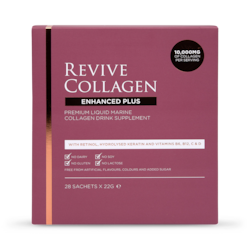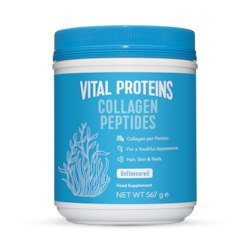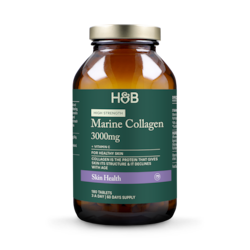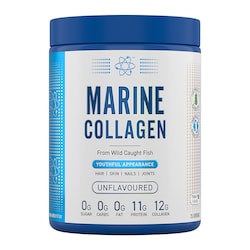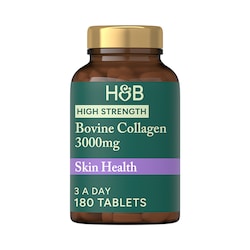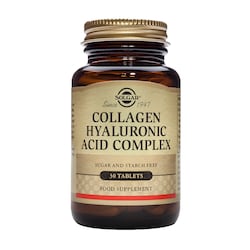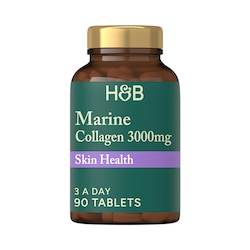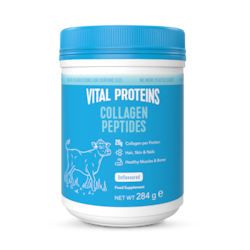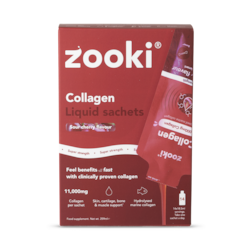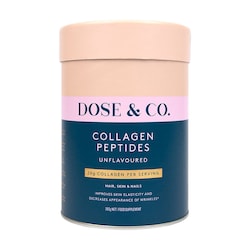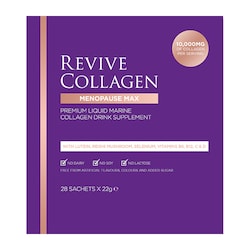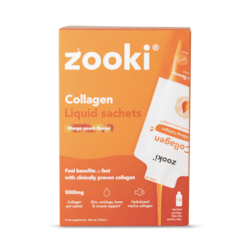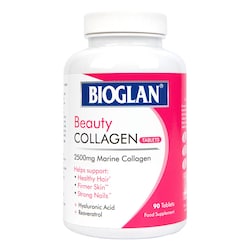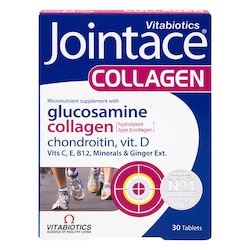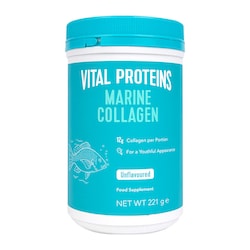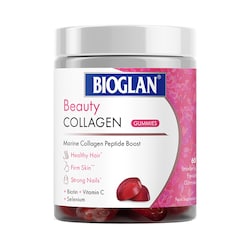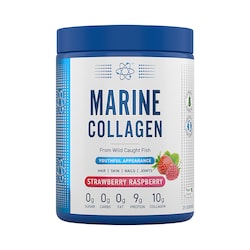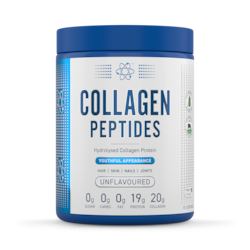15% off £20
Code:BAG
Is vegan collagen effective and does it exist?

Vegan collagen - is it the real deal? We delve into all things vegan collagen in our guide, from its differences to regular collagen, its benefits and much more.
Summary
1What is collagen made of?
The body makes its own collagen, through a process referred to as collagen synthesis. For this to occur, the body needs a variety of amino acids...
28 differences of vegan/animal-sourced collagen
Now you might be wondering, what are some of the key differences between vegan and animal-sourced collagen? From the ingredients to the production...
3Can you get vegan collagen supplements?
There are vegan collagen supplements on the market which have been designed to stimulate the body’s production of collagen, rather than providing...
You might have noticed that when it comes to health and beauty, collagen is one of the key buzzwords of the moment.
But your knowledge might only extend as far as knowing that it’s important for keeping joints and bones healthy - and skin, hair and nails looking good.
Although if you are vegan, it’s important to distinguish between collagen-containing animal derivatives and vegan collagen. We can help with that.
Most collagen is naturally found in bones and the connective tissue of fish and animals, which means that vegans and vegetarians can struggle to add it to their diets and supplements.
Moreover, there are also more people looking for sustainable, environmentally friendly and cruelty-free ways to get their collagen fix, which do not rely on the typical bovine or marine forms that have traditionally been offered in most supplements.
So, what other vegan alternatives are there to the more traditional forms of vegan collagen.
What is collagen?
Before we delve into the details of vegan collagen, we’re going to explain what collagen as a whole is first.
Collagen is a naturally occurring protein in the body, made up of amino acids. It is also available as an additional supplement if needed.
It is an integral component of all skin, hair, muscles, tendons, nails, bones and ligaments.1
Eating a balanced diet and having enough protein is essential for the body to break down the protein into amino acids to create collagen.
As you age, your body produces less collagen, which means that you may have to find different, additional sources of collagen.
What is collagen made of?
The body makes its own collagen, through a process referred to as collagen synthesis.
For this to occur, the body needs a variety of amino acids, such as glycine, proline and hydroxyproline.2
There are many types of collagen. Type I is found in skin, bones and teeth. Type II, meanwhile, is found in cartilage and Type III is found in the skin, muscle and blood vessels.3
On the market though, the main two forms of collagen are marine and bovine collagen.
Marine collagen is a type of collagen protein that is sourced from fish and other sea life such as jellyfish.
It is known to have a high collagen content. It is also absorbed well by the body and is considered eco-friendlier and more sustainable than other collagen sources.4
Bovine collagen comes from cows. It can help with joints and support the growth of hair and nails.
While gelatin is not technically classed as collagen, it is a collagen derivative, extracted from animal bones.

Is there vegan-friendly collagen?
It has long been thought that collagen can only be found in hair, skin, nails, bones and ligaments, which has, of course, meant it was not suitable for the vegetarian and vegan communities.
However, more recently, scientists have begun to produce a form of collagen made from genetically modified yeast and bacteria.5
A digestive enzyme is then added to this formula, to help match the structure of human collagen, to create a truly vegan form of collagen.
This type of collagen is not just suitable for those who prefer not to eat animal products.
Due to the way it is produced, it is not only a lower-cost alternative but also carries less of a risk of allergic reaction and has the potential to be more sustainable.
8 differences between vegan and animal-sourced collagen
Now you might be wondering, what are some of the key differences between vegan and animal-sourced collagen?
From the ingredients to the production, find out what sets them apart from each other below.
As vegans don’t consume or use any products that contain ingredients derived from animals, this is the same for plant-based collagen products.
Instead, vegan collagen supplements sometimes come from more natural ingredients such as yeasts and bacteria.
But these are only just being produced now so they’re tricky to get your hands on at the moment.
As genetically modified vegan collagen isn’t quite on the market yet, a lot of vegan collagen products are known as ‘boosters’ or ‘builders’ instead.
This is largely because you can’t actually get collagen from plants, but you can get ingredients that boost collagen from plants.
These include:
- Aloe vera
- Collagen support foods rich in vitamin C, as it boosts hyaluronic acid levels e.g. kale, oranges, red peppers
- Coriander
- Ginseng6,7,8
The clue is in the name, but people often overlook where the collagen in animal-based supplements actually comes from.
For example, bovine collagen supplements that are derived from cows, are usually made by boiling cow bones or other by-products, the collagen is extracted and then dried to make it a powder or tablet.9
When assessing the EU’s Health and Nutritional Claims Register, marine and bovine collagen claims have not yet been authorised as being proven to work (in the way they’re claimed to).
However, plant-based collagen support ingredients like Vitamin C do make the list. With claims like these being officially authorised:
- “Vitamin C contributes to normal collagen formation for the normal function of blood vessels”
- “Vitamin C contributes to normal collagen formation for the normal function of bones”
- “Vitamin C contributes to normal collagen formation for the normal function of skin”10
As mentioned previously, while this isn’t widely available at the moment – actual vegan collagen is being produced using genetically modified types of bacteria and yeast instead of using animal products.11
When it comes to vegan collagen support supplements, a lot of them contain vitamin C as this has been scientifically proven in areas like the skin fibroblasts that are said to “have an absolute dependence on vitamin C for the synthesis of collagen”.12
Another key difference between animal and plant-based collagen supplements is that supplements made using microorganisms may have more consistency across batches and maybe more allergy-friendly.13
The vast majority of collagen supplements available to consumers are made from animal products.
This makes it much harder for those who try to live a more sustainable or vegan lifestyle to find the products they need.
A wide range of nutrients is needed in order for our bodies to produce collagen.
From amino acids to vitamin C, hyaluronic acid, phytoceramides and antioxidants.
However, these extra nutrients are not often found in traditional collagen peptides products.14
Can you get vegan collagen supplements?
There are some vegan collagen supplements on the market which have been designed to stimulate the body’s production of collagen, rather than providing a direct supply of it.
These contain antioxidants and vitamins and minerals to kick-start the natural processes of the body.
This means that these ingredients can all be derived from plant extracts to help support our skin and joints.
They also contain vitamin E, vitamin A, aloe vera, rosehip, hyaluronic acid and other superfoods to support the skin, helping to make it appear more healthy and radiant.
These supplements come in the form of tablets which simply need to be taken once a day. Or you can choose a collagen powder, which can be added to other protein shakes, smoothies, or even your morning coffee.
Vegan collagen peptides
Some supplements have also focused on delivering the amino acids within collagen in place of the collagen itself.
These contain collagen protein which has been broken down into shorter chains of amino acids, known as collagen peptides.16
These peptides are thought to stimulate the natural collagen production in the body, leading to visible and tangible results over time.
Some of the best supplements are those with a high concentration of collagen peptides.
Vegan products are not certified by a governing body, which means there are no certification stamps to look out for.
However, most product descriptions will highlight if an item is vegan. We have also created a list of what to look out for in our vegan beauty guide.
Some collagen-rich vegan sources include nuts, seeds, soya foods such as tofu and beans. For more on this, including non-vegan foods, check out our article on 7 collagen rich foods.
Natural vegan collagen alternatives
There are several elements found in plants that can stimulate the body into producing more collagen itself, rather than adding it directly.

To make collagen, your body needs vitamin C and zinc, which can be found in a wide range of fruit and vegetables.
The most abundant amino acids in collagen are glycine, lysine and proline, and these are available in plant-based foods such as tofu, black beans, pistachio nuts, peanuts, cashews and pumpkin, sunflower and chia seeds.
Can you get vegan collagen tablets?
You can get a range of vegan collagen support gummies and tablets – whether they’re targeted as collagen supporting or they contain ingredients that help collagen production like vitamin C, vitamin E, l-lysine and more.
Can you get vegan collagen powder?
You can also get your hands on vegan collagen products in powder form too.
This is especially good if you struggle with regular tablets.
And some powders also come with other beneficial nutrients like plant-based protein powder mixed in.
Are there vegetarian collagen options?
Yes, there are also vegetarian collagen options. Vegetarian collagen helps to support the collagen synthesis process as well.
Holland & Barrett have a range of vegetarian collagen supplements which contain vitamin c and astaxanthin, to help maintain healthy-looking skin.
What are the general benefits of collagen?

Collagen has attracted plenty of attention in recent years because of its perceived anti-ageing benefits.
Other environmental factors such as pollution as well as smoking and drinking can also lead to skin ageing.18
There are plenty of other benefits to collagen as well. For instance, hydrolysed collagen, which is collagen that has been broken down into more easily dissolvable amino acids, can help to reduce joint discomfort – but more on this below.19
The amino acids in collagen can help to build keratin in your hair. As hair is made up of keratin, it is important for your body to have enough protein to maintain normal hair growth. Collagen can also aid nail growth and help to reduce brittleness.20
Collagen for healthy joints
As we just mentioned, it is crucial to remember that collagen is not just about beauty.
It is also very important in keeping joints healthy.
You can read more about bone, joint and muscle health on our Health Hub, including ‘Caring for inflamed and stiff joints’ and ‘How to support bone health: tips to keep your bones healthy’.
These articles have some great tips on maintaining strength and health naturally, and without animal by-products.
These are great alternatives to collagen supplements and the more common aspects of a collagen-rich diet, meaning that it is accessible for everyone without pricking on your conscience.
Whether you are vegan, vegetarian or simply environmentally conscious, there are now cruelty-free, plant-based collagen alternatives that can be enjoyed by everyone to firm your skin, strengthen your nails and support bones and joints whatever your age, diet or priorities.
The final say
There are a few key differences between animal-derived collagen and vegan collagen supplements, from the ingredients used to the process and even the scientific evidence to back up the ingredients and the claims.
So if you’re interested in trying some plant-based collagen supplements for yourself, check out our guide to the best vegan collagen supplements online today.
Before trying a collagen beauty product, remember to do a patch test on your skin first, especially if you suffer from sensitive skin.
- https://kidshealth.org/en/parents/collagen.html
- https://www.ncbi.nlm.nih.gov/pmc/articles/PMC6891674/
- https://www.ncbi.nlm.nih.gov/pmc/articles/PMC6891674/
- https://www.mdpi.com/journal/marinedrugs
- https://link.springer.com/article/10.1007/s00253-005-0180-x
- https://www.ncbi.nlm.nih.gov/pmc/articles/PMC2763764/
- https://www.ncbi.nlm.nih.gov/pmc/articles/PMC4110621/
- https://pubmed.ncbi.nlm.nih.gov/25867599/
- https://www.ncbi.nlm.nih.gov/pmc/articles/PMC5707681/
- https://ec.europa.eu/food/safety/labelling_nutrition/claims/register/public/?event=search
- https://www.ncbi.nlm.nih.gov/pmc/articles/PMC6213755/
- https://link.springer.com/article/10.1007/s00253-005-0180-x
- https://www.ncbi.nlm.nih.gov/pmc/articles/PMC5579659/
- https://www.luckyvitamin.com/blog/food-supplements/supplements/traditional-collagen-vs-plant-based-collagen-builders-which-is-right-for-me-advertisement/
- https://www.ncbi.nlm.nih.gov/pmc/articles/PMC6566836/
- https://pubmed.ncbi.nlm.nih.gov/16723701/
- https://www.nhs.uk/live-well/eat-well/food-and-drinks-for-sport/
- https://www.nia.nih.gov/health/skin-care-and-aging
- https://www.versusarthritis.org/about-arthritis/complementary-and-alternative-treatments/types-of-complementary-treatments/collagen/
- https://www.ncbi.nlm.nih.gov/pubmed/28786550
The advice in this article is for information only and should not replace medical care. Please check with your GP or healthcare professional before trying any supplements, treatments or remedies. Food supplements must not be used as a substitute for a varied and balanced diet and a healthy lifestyle.


